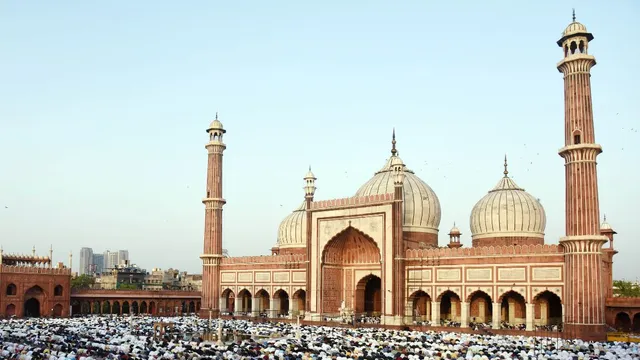- By Imran Zafar
- Wed, 04 Dec 2024 01:27 PM (IST)
- Source:JND
Vishnu Gupta, National President of Hindu Sena, wrote to the Archaeological Survey of India (ASI) director general, urging a detailed survey of Delhi’s Jama Masjid. The Hindutva outfit leader claimed that the 17th-century mosque was constructed on the ruins of Hindu temples from Jodhpur and Udaipur, allegedly destroyed by Mughal emperor Aurangzeb.
Vishnu Gupta’s letter alleges that idols of Hindu deities were used in the mosque's construction, with some purportedly buried beneath the stairs to disrespect Hindu religious sentiments. He called for an ASI investigation, arguing that historical evidence supports the claims that Mughal emperor Aurangzeb's actions were intended to humiliate Hindus. He believes that the survey could reveal remnants of the original temples, shedding light on the mosque's true origins.
''I drive to your consideration that alleged Jama Masjid, Delhi was constructed after demolition of Hundreds of Temples of Jodhpur & Udaipur and using the remains of Temples including the idols of deity in the stairs of said mosque to humiliate the Hindus by Mughal invader Aurangzeb,'' the letter addressing ASI Director General read.
Vishnu Gupta also requested that any discoveries made during the survey be preserved and the findings shared publicly. He claimed that such a move would provide transparency and historical clarity regarding the mosque’s construction. The ASI has not yet issued a response to the request.
''As the remains of the hundreds of temples and idols are buried under the stairs of the aforesaid alleged mosque, it is clearly harming my religious sentiments and right to perform worship of the deities buried under the stairs of the alleged mosque and being the concerned authority, it is duty of ASI to conduct the survey of Alleged Mosque,'' the letter further read.
Notably, the request adds to ongoing controversies over religious sites where mosques are alleged to have replaced Hindu temples. Similar disputes involve the Gyanvapi Mosque and Mathura’s Shahi Idgah Mosque, which have also been claimed to be built over temple sites.
Places Of Worship Act
The Places of Worship (Special Provisions) Act, 1991, prohibits altering the religious character of sites as they stood on August 15, 1947, aiming to maintain communal harmony. However, the Act has faced legal challenges in cases like Gyanvapi and Shahi Idgah, highlighting the complexities surrounding such claims.

